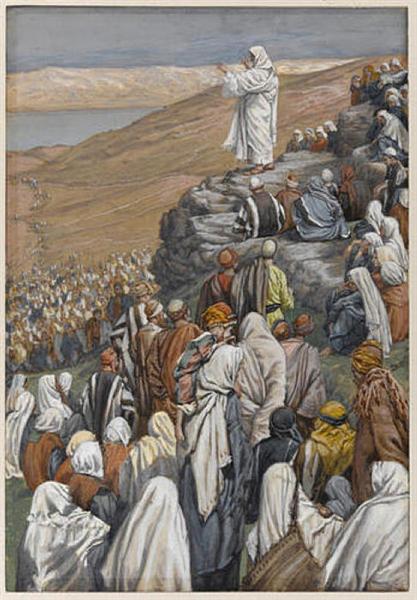Matthew 7:15-23
Pastor James Preus
Trinity Lutheran Church
July 21, 2028
People like to hear the words of St. Paul from Romans 8 that the Spirit bears witness with our spirit that we are children of God, that we have the right to call God Himself our Father. Yet, people don’t like that Jesus says, “Beware of false prophets, who come to you in sheep’s clothing, but inwardly are ravenous wolves.” These words seem divisive and judgmental. We don’t want to call anyone a false prophet. We’d rather let everyone have his own truth and respect every belief. But Jesus warns us against false prophets precisely because He wants us to be able to call God our Father and to be His children. It is the false prophets, who with their clever tricks and lofty speech would lead you down broad roads of destruction and away from your Savior Jesus Christ. Jesus stated clearly in John 14, “I am the way, the truth, and the life. No one comes to the Father except through me.” You cannot call God your Father unless you follow Christ’s teaching. Therefore, we must mark false teachers and prophets and avoid them.
False prophets come to you in sheep’s clothing. This means that they look like the good guys. They aren’t always going to publicly dress up like Satan and drink human blood as we see some doing in Hollywood and in the music industry. They will look like your friends. They will dress like your pastor. They will have winning personalities and even mix their lies with lots of truth, just as Satan quoted Scripture to Jesus when he tempted Him. St. Paul warns us that even Satan disguises himself as an angel of light (2 Corinthians 11:14). And so, false prophets will look and sound good to the untrained eye and ear. By their fruits you will know them, so you must recognize what good fruit looks like.
Jesus directs this warning to beware of false prophets both to preachers and to their hearers. This is a solemn and noble task, which no Christian may ignore. Pastors must mark false prophets and warn their people of them. In Nehemiah chapter 4, the Jews having returned from exile were building the walls of Jerusalem. Their enemies with violence tried to prevent them. So, the Jews continued their work with spears, shields, and bows. Workers bore their load in one hand and a weapon in the other. Builders built with swords strapped to their sides. And this paints a perfect picture of what a pastor does. He not only builds up his hearers by preaching the true Word of God, the Gospel of Jesus Christ. He also defends them against false teaching, which seeks to tear down what has been built.
This is exactly what St. Paul instructs Pastor Titus and all pastors in Titus chapter 1, “A presbyter must hold firm to the trustworthy word as taught, so that he may be able to give instruction in sound doctrine and also to rebuke those who contradict it.” And this wielding of the sword against false doctrine, this rebuking those who contradict God’s Word is necessary. St. Paul warns the pastors of Ephesus in Acts 20, “Pay careful attention to yourselves and to all the flock, in which the Holy Spirit has made you overseers, to care for the church of God, which he obtained with his own blood. 29 I know that after my departure fierce wolves will come in among you, not sparing the flock; 30 and from among your own selves will arise men speaking twisted things, to draw away the disciples after them.” (vss. 28-30)
So, a pastor must not only preach that God is one, but He must also preach that every so-called god, which did not send his only begotten Son to suffer and die for the sins of the world is a false god. Muslims claim that Allah is the only God, but Allah is not the Father, Son, and Holy Spirit, three persons yet one God, and he did not send his son to die for us, so Allah is a false god. The Sikh woman, who prayed to Waheguru at the Republican National Convention last week claiming that he was the one true God was praying to an idol, not the true God, because Waheguru did not send Christ to die for our sins.
A pastor must not only preach that Jesus Christ is the Savior of the whole world who died for our sins, but he must also proclaim that those who continue in their sin without repenting will not enter the kingdom of God. A pastor must not only baptize babies and teach that Baptism saves, but he must also call out those who deny Baptism to babies and deny its saving power. A pastor must not only teach that the Lord’s Supper is Jesus’ true body and blood for the forgiveness of sins, but he must also reject the teaching that it is just a symbol and that Jesus’ body and blood are as far away from the altar as heaven is from earth. A pastor must not only preach that we are saved by grace through faith in Jesus Christ alone apart from our works, but he must also condemn the papist doctrine that we are saved also by our works and that God credits our works toward salvation. A pastor must not only extol biblical marriage between one man and one woman, a life-long union which God blesses with children, whom He intends to be brought to Him through Baptism and daily instruction in God’s Word, but he must also preach against fornication, homosexuality, unbiblical divorce, abortion, and the despising of God’s gifts. A pastor must not only invite people to hear the Gospel and extol the importance of hearing God’s preaching, but he must also declare that skipping church is a sin and refusing to hear God’s preaching and word will send you to hell.
A pastor cannot simply build without also defending with the sword and spear. He cannot only comfort and exhort, he must also refute and rebuke. As a shepherd cannot simply bring the sheep out to pasture, but must also fend off the wolves, so a pastor cannot simply preach the truth, but he must also refute all false teaching and false teachers.
But Jesus doesn’t only charge pastors to beware of false prophets. Jesus charges all Christians to watch out for these wolves in sheep’s clothing. St. John instructs all Christians in 1 John 4, “Beloved, do not believe every spirit, but test the spirits to see whether they are from God, for many false prophets have gone out into the world.” A tragic trend, which seems so innocent, is when people are “church shopping,” they often say, “We’re just looking for a church that fits us.” And that might be a good way to shop for a house, restaurant, or pair of jeans. But no where in Scripture does Jesus ever tell us to look for a church that fits us! Rather, Jesus says, “If anyone would come after me, let him deny himself and take up his cross daily and follow me.” (Luke 9:23)
Jesus does not charge you to find a church that fits you. This is exactly what Paul warns Pastor Timothy against, in 2 Timothy 4, “For the time is coming when people will not endure sound teaching, but having itching ears they will accumulate for themselves teachers to suit their own passions, 4 and will turn away from listening to the truth and wander off into myths.” (2 Timothy 4:3-4) Rather, Jesus charges you to deny yourself, follow Him, and beware of any false prophet, who would lead you away from Him with promises that you will fit in. We cannot be our own disciples. Rather, we must be disciples of Jesus.
But how can we be disciples of Jesus? We must not only go and hear God’s preaching, as Jesus says, “If you abide in My word, you are my disciples indeed, and you will know the truth and the truth will set you free.” (John 8:31) But you must also mark and avoid false teachers, who would lead you away from Christ. Yet, how can you recognize false prophets? Do you have a theology degree? Are you qualified to make such judgments? You don’t need a degree in theology! Jesus tells you how you will recognize false preachers. You will recognize them by their fruits. A teacher’s fruit is his teaching. You must judge what preachers preach to determine whether it comes from Christ your good shepherd, or whether it is a false teaching.
But what standard must you use to determine whether it is true or false teaching? The Bible. St. Paul writes in 2 Timothy 3, “All Scripture is breathed out by God and profitable for teaching, for reproof, for correction, and for training in righteousness, 17 that the man of God may be complete, equipped for every good work.” Holy Scripture is Christ’s Word. Faith comes from hearing and hearing through the Word of Christ (Romans 10:17). Jesus says that when the Good Shepherd comes, “the sheep follow Him for they know His voice. A stranger they will not follow, but they will flee from him, for they do not know the voice of strangers.” (John 10:4-5) So, when you hear preachers say things contrary to Scripture, you should mark and avoid them, because that is not the voice of your Shepherd.
You should recognize that a preacher that denies that the Bible is without error or who promotes pride in sexual immorality is a false preacher. A preacher who tells you to trust in yourself is a false preacher. Since Scripture clearly teaches that women cannot be pastors (1 Timothy 2:12; 1 Corinthians 14:34-35), a woman pastor is a clear indication of a false prophet.
The best way for you to recognize a false prophet is to know your Catechism. The Catechism teaches the fundamentals of the Bible: The Ten Commandments, the Apostles’ Creed, the Lord’s Prayer, and the explanations for Baptism, the Office of the Keys, and the Lord’s Supper. Our children learn the Catechism by heart before they receive Holy Communion. And armed with the Catechism on their heart, they are prepared to recognize a false prophet, because they know Jesus’ voice and will not listen to a stranger.
Do you know your Catechism? Why not? You have your whole life to pray it and meditate on it. Can’t you give five minutes per day to God’s Word? Are you prepared to distinguish between a false prophet who teaches manmade doctrines from a true teacher, who preaches from the Bible? Do you meditate on Scripture? Do you faithfully listen to His Word read and preached? God declares in Hosea 4, “My people are destroyed for lack of knowledge.” This is a rebuke for ignoring God’s Word. You do not recognize false preachers by instinct. It must be taught by God’s Word. So, Christians must continue to listen to and hear God’s Word.
The aim of all Scripture is to teach you the Gospel of Jesus Christ, that God sent His own Son to suffer and die for your sins, so that you may be saved by grace through faith in Him alone. False doctrine threatens this aim. The teaching that your sins do not matter and you can continue in them is an attack on the Gospel, because saving faith cannot abide with impenitent sin. The teaching that there are errors in the Bible is an attack on the Gospel, because it causes you to doubt whether anything is true in Scripture. The teaching that the Sacraments do not give the forgiveness of sins is an attack on the Gospel, because Christ Jesus instituted the Sacraments to give us His forgiveness and grace to be received through faith. Yet, the most brazen attack on the Gospel is often the most successful, when the Gospel is directly contradicted or entirely omitted, as it is in many churches.
And, so your ears must be searching to hear the pure Gospel, that Christ Jesus has purchased your salvation by His innocent sufferings and death and that He gives this salvation to you as a gift by the forgiveness of sins to be received through faith. If you do not hear this Gospel or hear that you are saved by your works, then you must flee.
Many will call out to Christ on the Last Day, but Jesus will answer that He never knew them, because they rejected His Gospel and followed lawless doctrines. Yet, those who mark and avoid false teachers and cling to Christ’s Gospel and all His teaching will enjoy calling God, “Father,” for all eternity. May God keep us steadfast in the narrow way. Amen.




 RSS Feed
RSS Feed